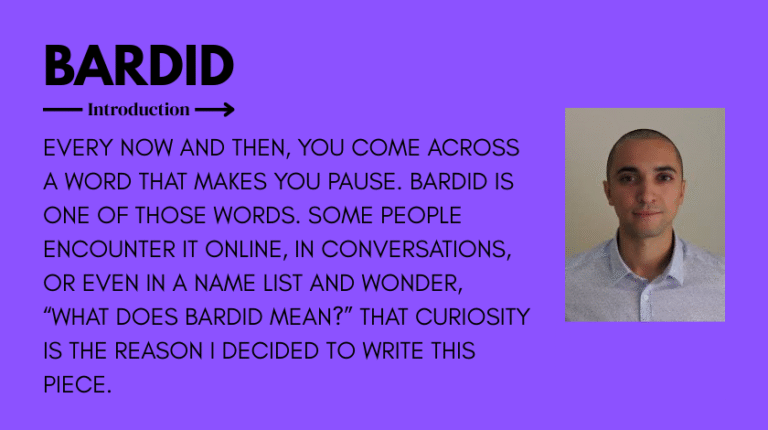Every now and then, you come across a word that makes you pause. Bardid is one of those words. Some people encounter it online, in conversations, or even in a name list and wonder, “What does bardid mean?” That curiosity is the reason I decided to write this piece.
I’ll break down what bardid could mean, where it may have come from, how it’s used, and why it matters. Think of this as a guide for anyone who has stumbled on the word, scratched their head, and wanted a clear, beginner-friendly explanation. Along the way, I’ll add examples, context, and thoughts that help you see bardid in a practical light
What Is Bardid?
At its core, bardid is a word that can be understood in two main ways:
-
As a name or proper noun (used for a person, place, or brand).
-
As a word with cultural or linguistic roots, depending on the language or region.
For example, in some languages, similar-sounding words connect to themes of poetry, storytelling, or heritage. That’s not surprising, since “bard” is a well-known word for a poet or storyteller, especially in Celtic and European traditions. The addition of “id” at the end could signal a variation, dialect, or modernized form.
Even if you’ve never heard it before, bardid has a structure that feels familiar. It is short, easy to pronounce (bar-did), and has a rhythm that makes it stick.
Origin and History of Bardid
The tricky part about bardid is that it doesn’t have one clear, universal origin. Instead, it appears in different contexts:
-
Linguistic roots: The “bard” part links to old traditions of poets and singers. A bard was someone who preserved history through stories and verse. Adding “id” could either be a suffix or a regional twist.
-
Cultural connections: In some regions, bardid appears as a surname or part of family heritage. Names often carry history, and bardid may be one such example.
-
Modern usage: In recent years, bardid pops up in online platforms, usernames, and even as a brand or product name. This shows how flexible and adaptable the word is.
So while bardid doesn’t belong to one single dictionary definition, it has layers that make it interesting to explore.
Significance of Bardid
Why does bardid matter? The answer depends on how you encounter it.
-
If bardid is a name, then it carries identity. Names are deeply personal, and even if uncommon, they give someone uniqueness.
-
If bardid is a word in language, then its significance lies in heritage, meaning, and how it’s used in speech.
-
If bardid is a brand, then its importance is tied to recognition, marketing, and trust.
This flexibility is what makes bardid intriguing. A single word can hold value in different ways depending on the setting.
Read Also: The Full Story of Karley Gerbenskey
Examples of Usage
To make this clearer, let’s look at examples of how bardid might appear:
-
As a name: “Bardid attended the conference and shared valuable insights.”
-
In a cultural sense: “The bardid tradition has preserved stories for generations.”
-
As a brand/product: “Have you tried Bardid? Their service is gaining popularity.”
These examples show that bardid isn’t tied to one single identity. It adapts to the situation.
How to Use Bardid Correctly
If you’re writing or speaking and come across bardid, here are some tips:
-
Capitalize it if it’s a name or brand. For instance, “Bardid Software” should always have the capital “B.”
-
Check the context. If it’s used in a sentence like “the bardid stories,” then it leans toward a descriptive or cultural meaning.
-
Avoid assumptions. Since bardid can mean different things in different places, it’s safer to clarify rather than guess.
Related Terms and Alternatives
Bardid sometimes gets confused with similar terms. A few related ones include:
-
Bard: A poet, storyteller, or singer of history.
-
Bardi: A surname found in Italy and other regions.
-
Bardic: Relating to poets or bards.
-
Bardid (variant spellings): Different spellings may appear online.
These words share common roots and help you see bardid in a broader family of terms.
Personal Reflection
The first time I came across bardid, I was unsure if it was a typo or a name. That moment of confusion made me realize how often we take words for granted until we slow down to unpack them. Over time, I noticed bardid appearing in usernames and even in a family history context. That personal experience reminded me that words don’t need to be “famous” to matter. Sometimes, they gain meaning from the people who use them.
Frequently Asked Questions
1. What does bardid mean?
It can mean different things depending on context. It may be a name, a cultural reference, or even a modern brand term.
2. Is bardid a name?
Yes, in some cases it is used as a first name or surname.
3. Where does bardid come from?
It may stem from the word “bard,” which refers to poets and storytellers.
4. How do you pronounce bardid?
It is pronounced “bar-did.”
5. Is bardid a brand?
In some contexts, yes. Certain modern companies or online platforms may use Bardid as their brand name.
Conclusion
Bardid is one of those words that sparks curiosity. It doesn’t belong to one strict dictionary entry but instead shifts depending on how and where it’s used. For some, it’s a personal name. For others, it connects to culture or language. And for many today, it might even be a brand or online identity.
The key takeaway is that bardid’s meaning isn’t fixed, but its value lies in its adaptability. Whether you see it as a name, word, or brand, it carries significance because people give it meaning. And in the end, that’s what makes bardid worth paying attention to.
